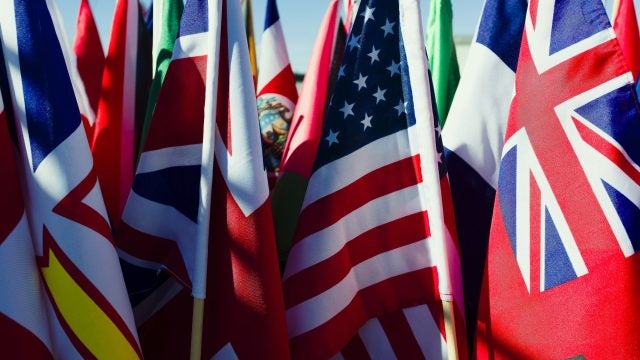
Title: The Journal Revisited: A New Direction for US-Egyptian Relations by Lucas Chan
In the GJIA Summer/Fall 2011 issue ,Shadi Hamid’s article, “An Unfinished Revolution,” predicted a difficult transition for Egypt as it shifted from dictatorship to a democracy.
Hamid, the Director of Research at the Brookings Doha Center, said that Western support was crucial: “democratization is more likely to succeed with, rather than without, constructive engagement from Western governments and organizations,” and also cited analysis that showed states with “extensive ties and linkage to the West” had much more success in transitioning to democracy. In the absence of external support, Egypt’s nascent democracy could end up worse than its predecessor.
Hamid’s words were prophetic. While Egypt completed parliamentary elections for the lower house with high levels of turnout, turnout for the Egyptian Parliament’s Shura Council (the upper house) has been much lower. This comes on the heels of violence between protestors and the military in mid-December and a bizarre decision by the Supreme Council of the Armed Forces (SCAF), the military leadership currently ruling Egypt, to bar six Americans working with NGOs from leaving Egypt. The SCAF’s actions have threatened the already-damaged relationship between Egypt and the United States; not only have lobbyists pushing Egyptian interests in Washington ended their contracts but President Obama has also threatened to withhold economic and military aid to the Egyptian government.
The release of $1.55 billion in aid is contingent upon certification that the: “[Egyptian] government is meeting its obligations under the 1979 Egypt-Israel Peace Treaty and that the Government of Egypt has held free and fair elections and is implementing policies to protect the rights of journalists, due process, and freedoms of expression and association.” The military government’s stubborn insistence on maintaining Mubarak-era rules preventing foreign countries from funding NGOs working in Egypt—Mubarak was afraid that well-funded NGOs posed a risk to his rule— certainly is not helping it achieve Congress’s standards.
This deteriorating relationship between the US and Egypt’s ruling body comes in the midst of a government transition mired in a backdrop of domestic and economic instability. While Egypt’s elections were generally praised as being free and fair, the country still does not have an amended constitution or a president, meaning executive and legal power still resides firmly in the hands of the military.
Since the 1979 peace agreement between Egypt and Israel, Egypt has been a Western ally that has not attacked Israel. However, the new elected government will be much more publicly accountable making more hostile relations with Israel a distinct possibility. Moreover, one of the first political actions that the SCAF took after gaining control of the government was to open the Suez Canal to Iran. This increased cooperation between Egypt and Iran and further isolation of Israel has spawned headaches for US policymakers. While Egypt will not want to risk losing US aid by allying with Iran, if that aid were not to cease because of the SCAF’s inability to commit to a complete democratic transition, then foreign relations would be more answerable to Egyptian public opinion. The Israeli embassy was stormed by Egyptian protestors in October signifying a desire for a reorientation of Egyptian foreign policy.
At the end of the day, the US needs to do exactly what Hamid said, which is to provide assistance to Egypt so that it can democratize securely in a manner that will heal the fractured ties. To do this the American emphasis must be on reaching out to the Egyptian people. Currently, the overwhelming majority of US aid has been focused on the government and the military—which are not only one and the same but also ripe with corruption. This convinces Egyptians that US aid is not reaching their pockets and instead of lining the pockets of the elite. If public opinion is what matters, then the US needs to be speaking to ordinary Egyptians. If the world has learned anything in the past year, it is that common Egyptians, foot-soldiers and protestors alike, brought down Mubarak’s rule while fighting against the Egyptian elite and not the other way around.
A good solution is the European Bank for Reconstruction and Development’s (EBRD) goal of investing nearly $2.5 billion into North Africa, chiefly for developing democracy and market-based economies in Arab Spring countries. The EBRD’s approach is to allocate a majority of that money to SMEs: small and medium-sized entrepreneurs. This solution is sensible because it explicitly gives aid to the up-and-coming businessmen and laborers upon whose hands the longevity of a democratic and market-based society rests in. Moreover, the leaders of the Arab Spring have been trying to demonstrate that they want job development, not an ideological war between Islam and democracy. The irony is that Obama, in his May 15, 2011 speech on Middle East policy, outlined the refocus of the EBRD toward Egypt as one of his goals. Unfortunately for US soft power, aid will arrive to ordinary Egyptians from the European Bank for Reconstruction and Development, not from the US. With the instability of Egyptian politics and unpredictableness of Egyptian foreign policy and the knowledge that market-based economies go hand in hand with democratic societies, it’s imperative that the US demonstrate to the Egyptian lower and middle class that it is committed to helping them.
. . .
Lucas Chan is a freshman in the Edmund A. Walsh School of Foreign Service at Georgetown University and an editorial assistant for the Georgetown Journal’s online content.
Image credit: English: Cherie Cullen, Public domain, via Wikimedia Commons
This is an archived article. While every effort is made to conserve hyperlinks and information, GJIA’s archived content sources online content between 2011 – 2019 which may no longer be accessible or correct.
Recommended Articles

On May 20, 2025, the World Health Assembly unanimously adopted the World Health Organization (WHO) Pandemic Agreement, an international treaty designed to strengthen pandemic prevention, preparedness, and…

As the Trump administration proposes a sweeping overhaul of the US foreign assistance architecture by dismantling USAID, the Millennium Challenge Corporation (MCC), and restructuring the State Department, there is an…

The Trump administration’s abandonment of allies and embrace of Putin’s Russia has raised pressing questions about whether Estonia, Latvia, and Lithuania can continue to rely on NATO for…